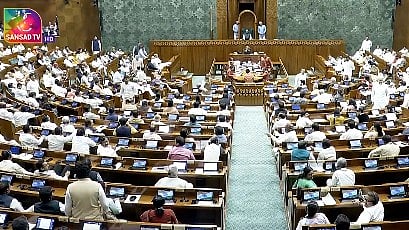
The voting on the bill started at 12:07 am and ended at 1:56 AM.
Credit: Sansad TV
New Delhi: After a 12-hour-long debate and a voting process that lasted 1:49 hours, a contentious bill seeking to amend the existing Waqf laws was passed with a 288-232 vote in Lok Sabha which saw ruling BJP and the Opposition locking horns by accusing each other of indulging in vote bank politics.
Sixty MPs as well as Home Minister Amit Shah participated in the debate that started a little after 12 noon on Wednesday and ended at 12:06 am on Thursday with Minorities Affairs Minister Kiren Rijiju, who piloted the bill, replying to the discussions. The voting on the bill started at 12:07 am and ended at 1:56 AM.
All four amendments seeking changes in Waqf (Amendment) Bill, including excluding tribal land and protected monuments from the ambit of Waqf, moved by government were accepted by a voice vote while all amendments moved by the Opposition were negated with one going to a vote.
Among other things, the bill proposes that only a person practising Islam for five years can donate property to Waqf and government properties cannot be declared Waqf property.
The Opposition insisted on division of votes on three occasions, including seeking permission for taking up the bill for passing, an amendment and the final passage of the bill. Opposition could not win any of the votes.
The amendment against the inclusion of non-Muslim on Waqf bodies moved by RSP MP NK Premachandran was defeated by a 231-288 vote. The bill was passed by 288-231 vote. Opposition MPs had submitted at least 132 amendments and none of them among those moved where accepted.
The Waqf (Amendment) Bill, 2025 is now set to be debated in Rajya Sabha on Thursday for passage. Once it is passed by the Upper House, the bill will become law after the President gives her assent.
While the bill brought the I.N.D.I.A, parties together after irritants had appeared in the bloc over its electoral reverses following the impressive Lok Sabha performance, the BJP also had a sigh of relief as critical allies like JD(U), TDP and LJP (Ramvilas) threw their weight behind the proposed legislation after initially raising concerns about certain provisions.
While NDA ministers and MPs accused the Opposition of misleading Muslims, the Opposition alleged that the government was demolishing the Constitution by targeting religious freedom of a minority community.
Rijiju said it is not a law to snatch the properties of Muslims but to help the poor members of the community. The minister said the Waqf properties were underdeveloped and with the new provisions, they could be used for the benefit of poor Muslims.
Attacking the Congress, he said that the UPA government had notified 123 properties as Waqf in 2013 and there were even claims on Parliament building by the Delhi Waqf Board. "If the Modi government had not come and if UPA had continued, we don't know which building they would have notified as Waqf," he said.
Initiating the debate, Congress Deputy Leader Gaurav Gogoi alleged that the ruling BJP’s eyes are on the land of the minority community.
"Which community do you want to mislead? The same community that fought for India’s independence? The community that sacrificed alongside Mangal Pandey in 1857? You want to tarnish the reputation of a community in which 2 lakh ulema were martyred? You seek to defame the community that supported us during the Quit India Movement? You want to stain the name of the community that supported the Dandi March," he said.
Intervening in the debate, Home Minister Amit Shah claimed that for vote-bank politics, fear is being spread that the Bill will interfere in religious matters of Muslims and properties donated to Waqf.
While DMK's A Raja said that the irony is that a party with no Muslim MP is claiming to protect the interests of the community, Trinamool Congress’ Kalyan Banerjee said the Bill is a "clear breach" of Muslims' constitutional right to manage their religious affairs.
What is in the Waqf (Amendment Bill, 2025?
* Properties identified as Waqf by User to remain so if not in dispute or identified as government land
* No tribal land can be declared Waqf property
* Protected monuments and areas will no longer be Waqf property
* Government properties cannot be declared Waqf property
* Only one practising Islam for five years can donate property to Waqf
* Women cannot be deprived of inheritance through Waqf dedication; special provisions for widowed, divorced and orphans
* Waqf income and properties to be reported in portal in six months
* Trusts created by Muslims will not be considered Waqf
* Central and State Waqf Boards to have non-Muslims, women members
* Officer above rank of Collector to determine disputes on whether a property is Waqf-owned or government-owned
